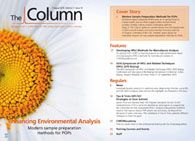Agilent Technologies Presents Thought Leader Award to Dr Lawrence Lesko
Agilent Technologies Inc. has announced that Dr. Lawrence J. Lesko from the University of Florida’s College of Pharmacy in Orlando, USA, has received an Agilent Thought Leader Award for his research into preclinical toxicological assessments of new medicines.
Agilent Technologies Inc. (Santa Clara, California, USA) has announced that Dr. Lawrence J. Lesko, of the Center for Pharmacometrics and Systems Pharmacology at the University of Florida’s College of Pharmacy in Orlando, USA, has received an Agilent Thought Leader Award for his research into preclinical toxicological assessments of new medicines.
Dr. Lesko and his team are working to identify novel biomarkers that can help drug makers better assess new drug candidates and can also potentially enable doctors to better manage treatments.
Monty Benefiel, Agilent vice president and general manager of the Mass Spectrometry Division, said: “We are pleased to support Dr. Lesko’s research, which is addressing important needs in the rapidly evolving field of systems toxicology.”
“I am very pleased and appreciative of Agilent’s Thought Leader Award,” said Dr. Lesko. “It enables our team to identify metabolomic safety biomarkers of drug-induced renal toxicity and the mechanisms by which these toxicities occur. This research will lead us to identifying at-risk patients and exploring the use of concomitantly administered medicines as protectants against drug-induced renal damage. It could have a major effect on improving drug development and clinical care.”

Reversed-Phases for LC Deliberately Doped with Positive Charge: Tips and Tricks for Effective Use
May 13th 2025In this month's edition of LC Troubleshooting, Dwight Stoll and his fellow researchers discuss both the benefits (improved peak shape/loading) and challenges (excessive interaction) associated with charge-doped reversed-phase (RP) columns for both analytical and preparative separations.
Evaluating the Accuracy of Mass Spectrometry Spectral Databases
May 12th 2025Mass spectrometry (MS) can be effective in identifying unknown compounds, though this can be complicated if spectra is outside of known databases. Researchers aimed to test MS databases using electron–ionization (EI)–MS.
Discovering the Hidden Plastic in Garden Compost with Pyr-GC–MS
May 12th 2025An Australian study used pyrolysis coupled to gas chromatography-mass spectrometry (Pyr-GC–MS) to analyze the presence of plastic polymers in commercial and homemade composts. LCGC International spoke to Simran Kaur—a PhD candidate at the Queensland Alliance for Environmental Health Sciences (QAEHS) at The University of Queensland in Woolloongabba, Australia—to find out more about her team’s findings.

.png&w=3840&q=75)

.png&w=3840&q=75)



.png&w=3840&q=75)



.png&w=3840&q=75)










